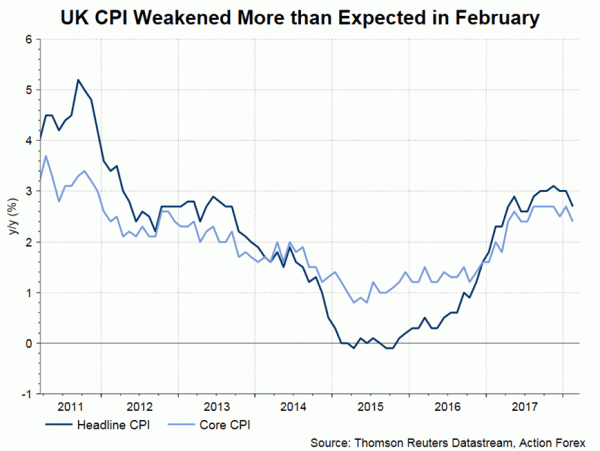Despite initial rally following the announcement of a Brexit transition deal, British pound has retraced much of its gains. Both UK and EU officials have hailed the agreement. While UK’s Brexit negotiator Davis David noted that the deal contains ‘a large part of what will make up an international agreement for the ordered withdrawal of the UK’, EU’s representative Michel Barnier indicated that it marks “decisive step” towards to eventual agreement of the UK-EU relations after Brexit. Yet, the terms of transition agreement reveal that the UK has backed down on various fronts. Over the past meetings, the BOE has suggested that the rate hike pace should be faster than what has been priced in by the market. It also added Brexit uncertainty is a key concern for its monetary policy decision. The transition deal signals soft Brexit is now more likely. We expect the BOE to signal at the meeting later this week that it might increase the Bank rate in May, following a hike in November last year. The disappointing February inflation report (headline CPI eased to +2.7% y/y while core CPI slowed to +2.4% y/y, both missed expectations) should not affect monetary decision making.
As suggested in the UK-EU joint statement, the transition period will last from Brexit day on March 29, 2019 to December 31, 2020. The key terms in the agreement include the followings: EU citizens arriving in the UK between these two dates will enjoy the same rights and guarantees as those who arrive before Brexit. The same will apply to UK expats on the continent; The UK will be able to negotiate, sign and ratify its own trade deals during the transition period; The UK will still be party to existing EU trade deals with other countries The UK’s share of fishing catch will be guaranteed during transition but UK will effectively remain part of the Common Fisheries Policy, yet without a direct say in its rules, until the end of 2020; Northern Ireland will effectively stay in parts of the single market and the customs union in the absence of other solutions to avoid a hard border with the Republic of Ireland. Indeed, PM Theresa May has described the arrangement for Northern Ireland as ‘unacceptable’ as it would effectively shift the existing land border to the Irish Sea and compromise UK sovereignty. Yet, the EU suggested this ‘backstop option” was a key part of December’s phase one agreement with the UK and this would remain effective “unless and until another solution is found”.
Comments from anti-Brexit Labour MP Chuka Umunna – ‘In the end the Brexiters have been prepared to compromise and surrender on almost every single point. On the divorce bill, on the primacy of European law, on freedom of movement, on fisheries, the Government has yet again capitulated. We should be in no doubt that this will be the shape of things to come in the negotiations over the future relationship’ – are fair enough. The UK has obviously backed down on issues regarding sovereignty and border control. Yet, this does not seem to be a big concern for global investors who focus more on the future trade relations between UK and EU. An increasing likelihood for soft Brexit has diminished uncertainty and should bode well for UK’s economic growth outlook. This should facilitate the BOE to proceed with more rate hikes this year.

